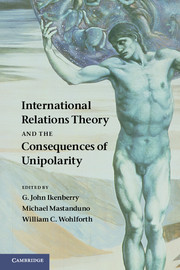Book contents
- Frontmatter
- Contents
- Figures
- Tables
- Notes on the contributors
- Notes on the editors
- 1 Introduction: unipolarity, state behavior, and systemic consequences
- 2 Unipolarity, status competition, and great power war
- 3 Legitimacy, hypocrisy, and the social structure of unipolarity: why being a unipole isn't all it's cracked up to be
- 4 Alliances in a unipolar world
- 5 System maker and privilege taker: US power and the international political economy
- 6 Free hand abroad, divide and rule at home
- 7 The liberal sources of American unipolarity
- 8 Unipolarity: a structural perspective
- 9 Unipolarity and nuclear weapons
- 10 From unipolarity to multipolarity: transition in sight?
- 11 Sell unipolarity? The future of an overvalued concept
- Index
- References
1 - Introduction: unipolarity, state behavior, and systemic consequences
Published online by Cambridge University Press: 05 June 2012
- Frontmatter
- Contents
- Figures
- Tables
- Notes on the contributors
- Notes on the editors
- 1 Introduction: unipolarity, state behavior, and systemic consequences
- 2 Unipolarity, status competition, and great power war
- 3 Legitimacy, hypocrisy, and the social structure of unipolarity: why being a unipole isn't all it's cracked up to be
- 4 Alliances in a unipolar world
- 5 System maker and privilege taker: US power and the international political economy
- 6 Free hand abroad, divide and rule at home
- 7 The liberal sources of American unipolarity
- 8 Unipolarity: a structural perspective
- 9 Unipolarity and nuclear weapons
- 10 From unipolarity to multipolarity: transition in sight?
- 11 Sell unipolarity? The future of an overvalued concept
- Index
- References
Summary
American primacy in the global distribution of capabilities is one of the most salient features of the contemporary international system. The end of the Cold War did not return the world to multipolarity. Instead the United States – already materially preeminent – became more so. We currently live in a one superpower world, a circumstance unprecedented in the modern era. No other great power has enjoyed such advantages in material capabilities – military, economic, technological, and geographical. Other states rival the United States in one area or another, but the multifaceted character of American power places it in a category of its own. The sudden collapse of the Soviet Union and its empire, slower economic growth in Japan and Western Europe during the 1990s, and America's outsized military spending have all enhanced these disparities. While in most historical eras the distribution of capabilities among major states has tended to be multipolar or bipolar – with several major states of roughly equal size and capability – the United States emerged from the 1990s as an unrivaled global power. It became a “unipolar” state.
Not surprisingly, this extraordinary imbalance has triggered global debate. Governments, including that of the United States, are struggling to respond to this peculiar international environment. What is the character of domination in a unipolar distribution? If world politics is always a mixture of force and consent, does unipolarity remove restraints and alter the mix in favor of force? Is a unipolar world likely to be built around rules and institutions or based more on the unilateral exercise of unipolar power? These questions have been asked in the context of a global debate over the projection of power by the former George W. Bush administration. To what extent was America's foreign policy after 2001 a reflection simply of the idiosyncratic and provocative strategies of the Bush administration itself, rather than a manifestation of the deeper structural features of the global system of power? These concerns over how a unipolar world operates – and how the unipolar state itself behaves – are the not-so-hidden subtext of world politics at the turn of the twenty-first century.
Information
- Type
- Chapter
- Information
- Publisher: Cambridge University PressPrint publication year: 2011
References
Accessibility standard: Unknown
Why this information is here
This section outlines the accessibility features of this content - including support for screen readers, full keyboard navigation and high-contrast display options. This may not be relevant for you.Accessibility Information
- 5
- Cited by
